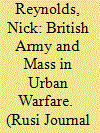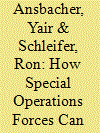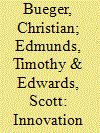|
|
|
Sort Order |
|
|
|
Items / Page
|
|
|
|
|
|
|
| Srl | Item |
| 1 |
ID:
181757


|
|
|
|
|
| Summary/Abstract |
The British Army faces a future where urban operations may take an increasingly prominent place. Despite this, it remains largely unready for any possible contingencies of this type. Of all the obstacles to the British Army being effective in a complex urban environment, the issue of generating, employing and sustaining sufficient mass is both prominent and poorly understood. Nick Reynolds argues that mass is not as useful in concentrating force in the attack as is commonly perceived, but is essential for dominating ground, screening and cordoning. The British Army will most likely either find itself fighting a peer or near-peer state adversary, or attempting to control a population in a failed state, and will do so as part of an alliance or partnership. Other allies and partners will provide much of the mass, which will mostly need to be employed for cordoning and ground-holding rather than in the attack. The British Army should prepare accordingly. There is also a need for a greater focus on the operational level of war, both conceptually and practically.
|
|
|
|
|
|
|
|
|
|
|
|
|
|
|
|
| 2 |
ID:
181753


|
|
|
|
|
| Summary/Abstract |
The UK’s 2021 Integrated Review of Security, Defence, Development and Foreign Policy states that the UK will no longer give public figures for its operational nuclear weapons stockpile, deployed warheads or deployed missiles, ending previous policies on transparency. Accurate accounting for historical holdings of nuclear weapons will likely be of importance in any future verifiable nuclear disarmament treaty. The National Archives provide details on the UK’s historical stockpile and its composition, and in this article John R Walker makes an initial tentative estimate of the UK’s annual holdings by weapon type between 1953 and 1977.
|
|
|
|
|
|
|
|
|
|
|
|
|
|
|
|
| 3 |
ID:
181755


|
|
|
|
|
| Summary/Abstract |
The commission of inquiry into the events of military engagement in Lebanon in 2006 asserted that Israeli special forces were improperly deployed during the Second Lebanon War. In this article, Yair Ansbacher and Ron Schleifer explore why the Israeli special operations forces’ (SOF) contribution to campaigns have been marginal, using the 2003 US deployment of SOF in Iraq as a point of comparison. They aim to identify and define the most effective deployment modes of modern SOF in war, and explain the changes that Israeli SOF must undergo to enhance future performance.
|
|
|
|
|
|
|
|
|
|
|
|
|
|
|
|
| 4 |
ID:
181758


|
|
|
|
|
| Summary/Abstract |
2021 is a key moment of opportunity for UK maritime security. The publication of the government’s Integrated Review in March is being followed by a systematic ‘refresh’ of the UK’s 2014 National Strategy for Maritime Security. In this article, Christian Bueger, Timothy Edmunds and Scott Edwards examine the role and significance of this strategy refresh, consider key priority issues for enhancing maritime security, and reflect on the challenges and opportunities that policymakers will face turning strategy into action. They conclude by arguing that getting maritime security right will be critical to delivering on the UK’s ambitions in security and foreign policy more widely.
|
|
|
|
|
|
|
|
|
|
|
|
|
|
|
|
| 5 |
ID:
181756


|
|
|
|
|
| Summary/Abstract |
Changes to conflicts involving the Israel Defense Forces (IDF) and its design in the Gideon and Tnufa (Momentum) multi-year plans necessitate a profound examination of how army reserves will be employed in aspects such as order of battle, organisation, fighting and support equipment, training, competence, and readiness for fighting scenarios and situations. In practice, the IDF’s operational concept for the reserves in emergency and war situations seems to have changed years ago, but it should be clearly defined and explained to all relevant entities, and in particular to the reserves themselves. Dotan Druck argues that the current concept is no longer ‘the regulars will hold’, as it originally was, but now ‘the reserves will hold’ or ‘the reserves will allow the regulars to decide’.
|
|
|
|
|
|
|
|
|
|
|
|
|
|
|
|
| 6 |
ID:
181754


|
|
|
|
|
| Summary/Abstract |
A blockade of Tigray is producing a manmade famine. The region, at war with Ethiopia and Eritrea since November 2020, is being deprived of humanitarian supplies. While the Ethiopian famine of 1984–85 was primarily the result of drought, exacerbated by war, it can provide useful lessons, as Martin Plaut shows. Unless supply routes are established via Ethiopia or Eritrea, or through Sudan, thousands could starve in what the UN describes as ‘the world’s worst famine situation in decades’.
|
|
|
|
|
|
|
|
|
|
|
|
|
|
|
|
|
|
|
|
|